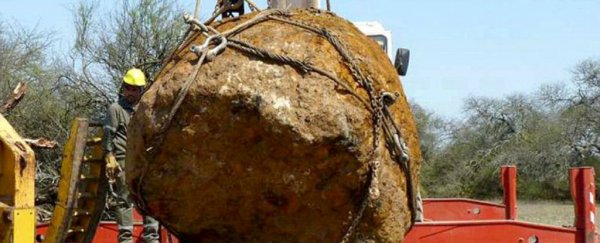A 30,800-kilogram meteorite has been unearthed in Argentina over the weekend, and experts have declared it to be one of the largest meteorites ever found on Earth.
The discovery, made on the border of Chaco, about 1,078 km (670 miles) northwest of the Buenos Aires, has been attributed to a meteor shower that hit the region more than 4,000 years ago.
Weighing in at more than 30 tons, the find has been controversially named the second largest meteorite on Earth, but until further tests are completed, it's too soon to give away that title just yet.
The undisputed king of Earth-based meteorites is a 66-ton whopper called Hoba, excavated in Namibia nearly a century ago.
While the Hoba meteorite has been fully uncovered from its resting place in the Otjozondjupa Region of Namibia, due to its size, it has never been removed.
It's thought to have slammed into Earth some 80,000 years ago, and its age has been estimated to be between 190 million and 410 million years.
The rival contender for the second spot is El Chaco - a 37-ton meteorite discovered in the same Argentinian field as this new find.
Now experts will need to perform additional weigh-ins to see if this new Argentinian meteorite, called Gancedo, can beat that and secure the title below Hoba.
"While we hoped for weights above what had been registered, we did not expect it to exceed 30 tons," Mario Vesconi, president of the Astronomy Association of Chaco, told the Xinhua news agency over the weekend. "[T]he size and weight surprised us."
The meteorite was uncovered in Campo del Cielo (meaning "Field of Heaven"), an area on the border between the provinces of Chaco and Santiago del Estero.
This surreal place is blistered with meteorite craters - at least 26 cover an area of just 3 km by 19.2 km (1.8 x 11.9 miles), the largest measuring 115 by 91 metres (377 x 298 feet), thought to have been impacted by a powerful meteor shower between 4,200 and 4,700 years ago.
An estimated 100 tons of space debris have been excavated from the site so far.
The new Gancedo meteorite will now undergo a number of tests, firstly to confirm its weight, and secondly to confirm its status as an actual meteorite.
"We could compare the weight with the other large meteorite found in the province. Although we expected it to be heavier, we did not expect it to exceed 30 tons," Vesconi told the Argentinian government's news service, Télam.
"We will weigh it again. Apart from wanting the added confidence of a double-check of the initial readings we took, the fact that its weight is such a surprise to us makes us want to recalibrate."
Here's some footage of the excavation:
